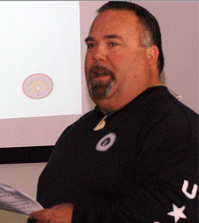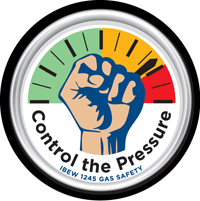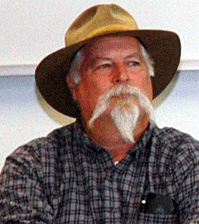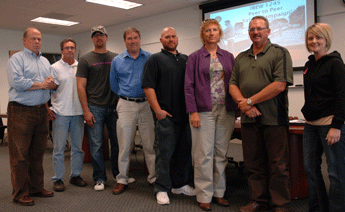By Eric Wolfe
Jerry DeBaca, a PG&E Gas Crew Lead Welder, posed that question during a trial run of Local 1245’s new peer-to-peer gas safety program at Weakley Hall in Vacaville on Oct. 7. It’s a sobering question, not easily shrugged off or turned into a breakroom joke.
Five days after DeBaca spoke these words, two more Local 1245 members were dead, drowned when their PG&E vehicle went out of control and plunged into the Rock Creek Reservoir on the Feather River.
To many it seems that the rate of deaths and serious injuries among IBEW members has also gone out of control. How do we regain control? As DeBaca asks, how do we stop hurting ourselves, hurting each other?
Local 1245 gas workers have taken a first important step by organizing a peer-to-peer safety campaign they call “Control the Pressure.”
“ ‘Control the Pressure’ is a Local 1245 safety initiative that asks all of us to challenge our view of safety, and to place responsibility for safety where it belongs—with us and our co-workers,” said Earnest Pena, a PG&E Gas Service Rep in Livermore. “We will work together on how to get there… We need to identify and control the pressures that make us work unsafe.”
Control the Pressure is more than just a name for the campaign. It is an attitude that says there’s something more important than getting the job done—and that is getting the job done safely. It is also a warning that can be called out on the job when somebody sees something that isn’t right.
“ ‘Control the Pressure’ stops work until everybody is brought up to speed,” said Jim Findley, a PG&E Measurement and Control Mechanic.
Rule-Breaking Kills
The question of rules and procedures is a big one. We all know the saying, rules are made to be broken. We know that rule-breaking has been often celebrated in Hollywood movies. And we know that rules are sometimes ignored at the jobsite—due to an overly-macho attitude or from pressure to get the job done.
But what we’ve learned in recent years is that rule-breaking kills.
One important rule is the use of Personal Protective Equipment.
“Appropriate PPE is always necessary, never an option,” said Aaron Leatherman, a Gas Crew Lead Welder in Modesto. “The PPE is there for a reason, it does protect you. People have been injured in the past that haven’t been using it—and if they had been using it they wouldn’t have been hurt.”
“The company puts in procedures that work,” said Adam Weber, a Gas Heavy Crew Foreman at NV Energy. “It’s our responsibility to follow those procedures.”
But following procedures alone doesn’t guarantee safety.
“At any time, (even if) you’re following procedures, something can go wrong. That’s why we’re always there to watch out for one another,” said Weber. “The group of guys I work with, they’re like my family. I spend more time with them than I do with my family. I want to make sure they go home safe.”
What can go wrong if you’re following all the required procedures? What can go wrong are all the thousands of things that make a human being so complicated. Pat Fryer, a PG&E Gas Service Rep in the North Bay, calls these “state of mind” issues.
“You can’t find any procedures or rules on how to deal with those. Yet it affects our safety and what we do.” (See “State of Mind”.)
Tuning Back In

Joseph Rapozo, a PG&E Gas Service Rep from Chico, discusses the IBEW Code of Excellence at the Oct. 7 trial run of the “Control the Pressure” program.
These Local 1245 gas professionals are blunt. There’s no way to sugar coat death and dismemberment, especially when it’s preventable death or dismemberment. They acknowledge that the current approach to safety is not adequate.
“A lot of times we go to these safety meetings we have. We’ve heard them over and over again and we tune them out. It’s not getting through to a lot of the people,” said Pena, the Livermore Gas Service Rep.
The goal of the Control the Pressure initiative is to get IBEW members to tune back in.
“None of this is new to anybody,” said Business Rep. Dean Gurke, who is coordinating the union’s peer-to-peer safety programs. “The new concept here is really take a look within, and take a look at your brothers and take care of your brothers around you.”
The union has begun to appoint safety stewards to help raise awareness in the field. What does that look like?
“First and foremost, it is your responsibility as union members, as crew members, or if you’re in gas service working by yourself, if you see something out there, if you see somebody that’s not working safe, talk to them,” said Gurke.
“Try to solve that in the crew situation, or where you gather as gas servicemen, if you know things are going on speak up about it, speak to that individual. Talk to them about why they’re working that way.”
The union hopes that this peer-to-peer contact “will help control the pressures we’ve talked about,” and that most problems can be resolved by the crews themselves, said Gurke. If someone is having difficulty understanding the message, safety stewards will be available as an additional resource. The goal is not to get on someone’s case—the goal is to educate about the importance of working safely. The newly-organized Gas Safety Advisory Committee will also be available to help.
“We don’t have all the answers yet, we’re just starting,” Gurke acknowledged. “But we’re trying to come up with procedures, methods of talking with people, methods to move forward, and how we can get to a safer workplace.”


